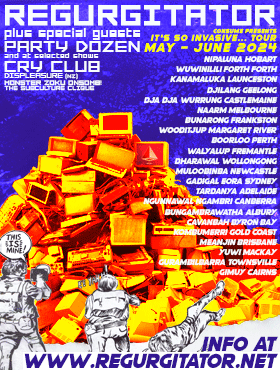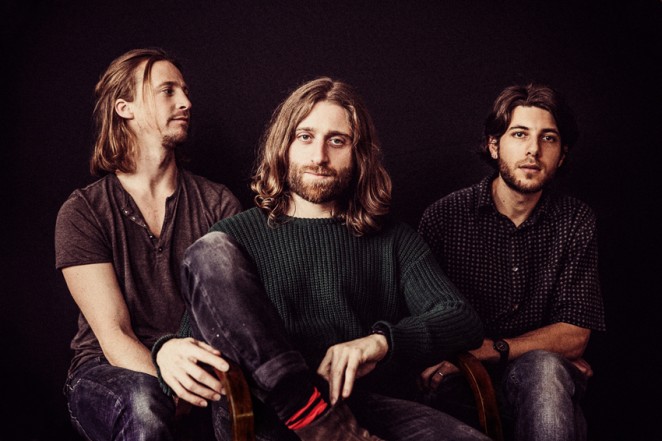
Melbourne-based folk-rockers Husky headed for the hills … Christmas Hills to be specific … to record their second album Ruckers Hill. The clean air, clear heads and Husky Gawenda’s songwriting smarts have resulted in a finely crafted recording, evidence of a band stepping up a notch. What’s most evident with the new album is that they’ve added an extra dimension to the music since their 2012 debut Forever So. There’s more colour and texture to grasp hold of and they’ve thought long and hard over the little nuances, which help to make a bolder musical statement than their first disc. Surely this band must have the most pristine backing harmonies in Australia at the moment and It’s no accident, the guys dedicated a great deal of their studio time to the vocal parts. It’s also no surprise that their musical heroes include Crosby, Stills, Nash and Young, Simon and Garfunkel and more current vocal-heavy artists such as Fleet Foxes and The Shins. They even brought onboard Phil Eks, known for his studio mastery with the Fleet Foxes to mix most of the album. Australian Musician’s Greg Phillips found a comfy couch and sat down with the band’s singer, songwriter Husky Gawenda and keyboardist Gideon Preiss to chat about the recording of Ruckers Hill.
What kind of things did you learn from the recording of your first album, that you took into this one?
Gideon: A lot. I don’t know where to start. All the things you learn around writing and creating an album. The time to write the right songs for Husky, all the technical things. At that time when we did the first record, we did everything ourselves and had never done before so there were things we were learning on the fly. Also bits and pieces about what it takes to get the best performances when laying down tracks. The first time around we didn’t know, not always sure what we were aiming for or even if we’d achieved it when we had. This time we knew a little better about saying, that was a great vocal take, we’ve got it now and trust ourselves. It was hard to trust our judgment the first time.
You recorded out of town in leafy Christmas Hills. Can a studio environment like that effect the way you perform in the studio as opposed to an inner city dungeon?
Husky: It certainly inspires you when you’re in the hills. It gives you an energy from being amongst the trees and air. I don’t know necessarily if it changed the kind of music we were making. Maybe it did?
G: I think it is very hard to measure the effect that it has but in my mind, there is no doubt your environment has an influence on your mood and feelings and what you are creating at the time. Essentially when you are in a studio and hit record, you are recording audio but what goes into that audio are all sorts of things that are going on in the room including your mood and the energy of the people in the room. I am sure that your surroundings are an influence.
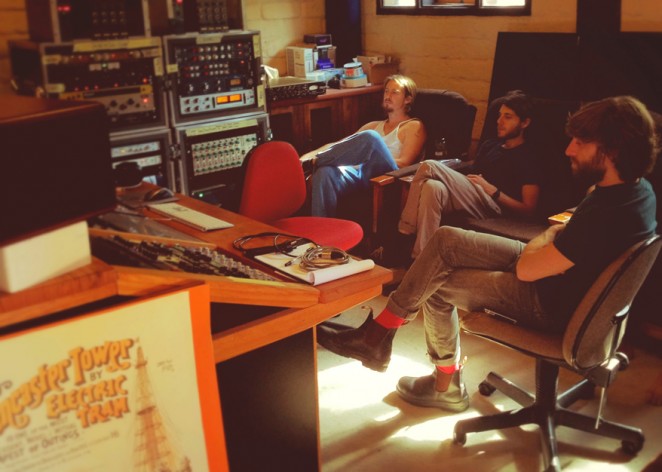 With the first album you had a credo that all the sounds had to be created by real instruments. Did you bend that rule a bit this time? Was there more technology involved?
With the first album you had a credo that all the sounds had to be created by real instruments. Did you bend that rule a bit this time? Was there more technology involved?
G: We were more open to it this time.
H: We were very strict about that on the first record. On the first album we still used computers and Pro Tools as we did on this album. We were still set on using the gear we love, the sound of not only instruments but microphones and pre-amps that we really love the sound of. It was not so much a matter of principal this time. If something sounded good and it was a sample rather than the real thing, we’d use it. If it works, it works! If it enhances the song or enhances the feeling of the song helps get the message across then we’d use it.
There’s a video of you performing the song Ruckers Hill at the studio in Christmas Hills. Did you actually record as a band like that at all?
H: We did. In fact, every song we’d start off recording as a band. Generally the way we do it is that we have the drums, bass, guitar and keys set up. We put down the beds like that as a band live.
G: As much as possible we try to use those actual takes. If we have a real piano, or real Hammond for example and we have enough separation between the drums and bass and guitar, then they will be the actual takes. The next step is to do some overdubs, so the vocals are overdubbed. It’s very difficult to get the vocals right at the same time as everything else that is going on, you get guitar bleed and all sorts of things. Essentially we begin recording live so you get the feeling of a band playing live and that is important.
Are you students of how the classic records that you are into were recorded?
G: There are definitely some technical, more nerdy elements that I have personally checked out. What kind of microphones they were using, how they set up in a room, how they captured the sound. I am very curious and interested in that stuff. Then there is a part of me that wants to not care about it too much. We worked with some really excellent engineers on this record who have so much experience recording bands and we also like to leave it to those who know best.
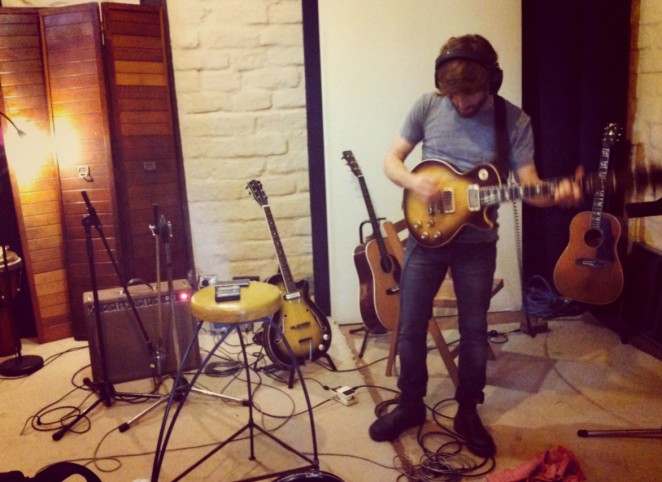 I was reading about how the guitar sound on the Crosby Stills and Nash track ‘Suite Judy Blue Eyes’ was an accident. The engineer took out a lot of the bottom-end on the first take because he believed Stephen Stills’ guitar sounded a bit dead in rehearsal and needed to be brighter. Come recording time though, Stills’ guitar playing came to life. He was about to ask Stills for a re-take when he complimented the engineer on the guitar sound. He thought he’d recorded the guitar too ‘toppy’ but Stills loved it …
I was reading about how the guitar sound on the Crosby Stills and Nash track ‘Suite Judy Blue Eyes’ was an accident. The engineer took out a lot of the bottom-end on the first take because he believed Stephen Stills’ guitar sounded a bit dead in rehearsal and needed to be brighter. Come recording time though, Stills’ guitar playing came to life. He was about to ask Stills for a re-take when he complimented the engineer on the guitar sound. He thought he’d recorded the guitar too ‘toppy’ but Stills loved it …
H: I can definitely relate to that, the happy accidents that end up being defining in songs. I think the only thing you have to do is be open to those accidents. They are going to happen over and over. If you are too set in your ways you won’t even hear that they are good and that some magic has happened. That serendipity in art is the most exciting thing.
You used Phil Ek who has worked with Fleet Foxes as a mixer. Did you use him on the first?
G: No, Phil Ek was amazing. He was a mixing engineer we dreamed of using. We really felt that he was a guy who could help realise our record. We love the Fleet Foxes records and others that he has mixed.
H: They really are some of our favourite modern records.
G: In fact the only bad thing about working with Phil Ek was that we didn’t get to work with the guy who mixed our first record, who was awesome and we developed a great relationship with. We will work with him again.
Something I noticed about the mix and it could be just my crappy desktop speakers but the bass seems to be mixed back…
H: I wouldn’t say it is intentional.
G: I don’t think there is a specific reason for it.
I think it gives the sound an openness…
G: Maybe that was intentional on his part. He is not a bass heavy mixer. He does go for what you describe as a more open sound. His mixes tend to be a bit more buoyant and less anchored by bottom end.
Would you say there is an overall theme to the album lyrically?
H: I don’t think there is a them so much as the songs come from a certain time in my life that happened to be geographically located in Ruckers Hill which is part of the reason why we named the album that. There’s not one theme. It’s just life, you know … living.
Husky, you borrowed your dad’s vintage typewriter for writing. What did you hope to achieve out of doing that?
H: I’m not sure really. I did a lot of things like that., seemingly small trivial things. I guess to try to spark inspiration or see how those things would influence my writing. Another way to change the way I was doing things and maybe result in a different kind of lyric or something but it was probably more superstitious than anything else.
Do you find you toil more over a chord or a lyric?
H: It’s a good question. I think it varies but probably lyrics. I’ll have a song but it has a hole in it. I’ll have a whole song except for a third verse or bridge and it can take me forever. It can happen quick but also evolve over time and take months sometimes to get those last lines that work and say what they need to say. So it doesn’t feel like I have just snuck it in to fill up the verse or bridge.
There are a lot of harmonies on the album. In general, how many takes were you doing per song?
H: Heaps. I find singing in the studio a lot harder than singing live. I’m not sure what thats about, something about the unnaturalness of singing in the studio.
G: Live, you get away with stuff. In the studio, it’s being captured. On stage, there’s a vibe, there’s an audience. If you don’t hit a note properly, it’s fine, it’s gone. In the studio, every little nuance has to be accounted for
H: On top of that, with harmonies, it’s threefold. We do work hard on that.
When it comes to reproducing those new harmonies live, how much work is involved in arranging?
G: It requires a lot of work and has required a hell of a lot. We had to learn how to do it. Husk had always done it. He had always sung with his family… his mum and sister. We worked hard on it, work-shopped it and talked about things which weren’t working. We specifically did vocal rehearsals. We practiced on our own and learned the parts. You have to find the right part that suits the right register. There are three or four different singers in the band. There’s a world of stuff which needs to happen.
H: It’s definitely the thing I find hardest .. singing in harmony, three part, sometimes four part live. That is a serious challenge
Do you use in-ear monitors?
H: No but we have talked about it. I think for a band in which harmonies are as important as they are in our band, we are probably going to end up on in-ears eventually because I think you can rely on them more than monitors and the acoustics of stages.
G: There are so many variables with venues too.
H: And if you can’t hear yourself properly and you are trying to sing three or four part harmony, you are in trouble.
Gideon, on the last album you payed a Kawai upright and Yamaha grand. Was it the same this time?
G: I played a different Yamaha grand. There’s a great piano at Echidna Studios in the hills. It is probably my favourite recording piano in Melbourne. That was a Yamaha C7. It has a lot of character. Did we record my upright?
H: We did, on Arrow, on Saint Joan and Heartbeat
G: Ok so that’s my Kawai upright. I really like it. We recorded the piano at Alberts Studios in Sydney which was a Challen, apparently the same type of piano The Beatles recorded a lot with. It’s an upright as well.
H: We recorded Ruckers Hill on that and Fats Domino and I’m Not Coming Back.
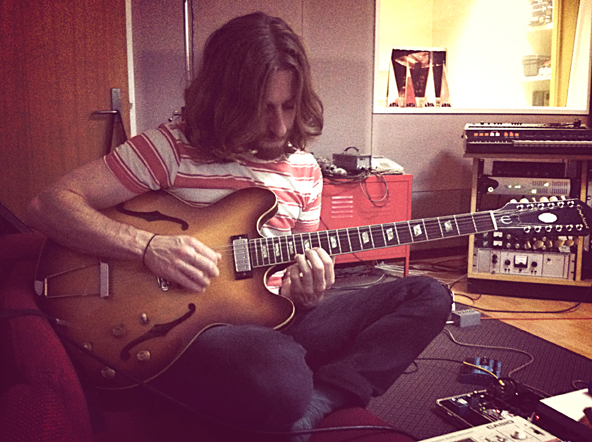 And what guitars did you use mainly on the album?
And what guitars did you use mainly on the album?
H: I used a bunch of guitars on the album, mostly not mine. The acoustics I used were the same Gibson I used on Forever So, an old 1950s. It’s one of the great guitars. I used a little Martin, a 1903 from a friend of Richard Stolz who did some recording with us. It weighed nothing! It was so resonant and just sang. Deep Sky Diver is on that guitar. We used a lot of electrics too, mostly a Tele.
G: We used a little old Echo, a Japanese guitar. There was a 12 string Epiphone which we used on Ruckers Hill. On Heartbeat we used a 12 string Rickenbacker… also a Jaguar.
Do you like fresh strings or played-in for recording?
H: Old. I like the deader older sound. I like the sound of an old guitar with the old worn-in string sound but I also feel like the deader strings sit in the mix better somehow. It’s almost a more compressed sound. In general I don’t like that zingy new string sound.
From one of your Facebook photos, it looked like you were recording a banjo in a cupboard at one point?
H: Yeah, that’s my wardrobe in Collingwood. We had a little studio set up, which was basically my control room, then we ran our mic leads into the bedroom and we did quite a lot of vocals in the wardrobe … banjo, some guitars, bits and pieces. It’s a controllable space. The clothes provide a deader space.
Was there a particular track which took longer than others?
G: Fats Domino we worked hard at. We recorded it and re-recorded it because we didn’t feel captured it properly. I still feel like we didn’t necessarily capture that song properly. We re-did all of the guitar parts, all the lines. We rewrote the bridge after we had already recorded the song, so that was quite laborious.
You are about to tour the album. Have you had to change anything gear wise for the tour?
G: I’m working on a whole new bunch of effects for my keyboards. A lot of them are geared toward more overdriven, thicker keys sounds for some things to take the place of some electric guitars.
H: There are a lot of electric guitar parts on the album or effects from guitars that Gids recreates live with his keyboards
G: Husky has a new electric too.
H: Yes, it’s a Nash Guitar out of America, a Tele copy. I’ve never played electric live before in this band.
Is it a process you enjoy, transferring the recorded album to a live situation?
G: I love it. It is one of my favourite parts of what we do. It’s one of the really innovative parts of what we do. I guess what happens is, you get your show together and play the shows but you only get one shot at really preparing. You’re always tweaking things but you only get one real shot at it.
H: It’s also cool because you find that some songs are really difficult to translate live and some are really easy and fun but both are good. The challenge is interesting. You slowly feel it coming together and it’s really rewarding when you are playing it and suddenly it is feeling right. On the other hand, there are songs that immediately sound great and are fun to play.
 What’s the grand plan for Husky?
What’s the grand plan for Husky?
H: I think to try to keep making good music.
G: I think the grand plan is what we are doing now, making good music, put on good shows, try to reach and effect people, see the world.
H: Those things are all great and important, even make some money out of it but I still think the core thing is to do our best and make something good. That’s all you can really do. You can’t force people to love your music or radio to play it. We work very hard at making good stuff.
RUCKERS HILL IS OUT OCTOBER 17
HUSKY RUCKERS HILL TOUR DATES
Tickets on-sale now
Fri 7 Nov Bridge Hotel, Castlemaine VIC
www.oztix.com.au
Sat 8 Nov Karova Lounge, Ballarat VIC
www.oztix.com.au
Thu 13 Nov Oxford Art Factory, Sydney, NSW
www.moshtix.com.au
Fri 14 Nov Small Ballroom, Newcastle NSW
www.oztix.com.au
Sat 15 Nov Transit Bar, Canberra ACT
www.moshtix.com.au
Sun 16 Nov Brass Monkey, Cronulla NSW
www.oztix.com.au
Fri 21 Nov Spotted Cow, Toowoomba QLD
www.oztix.com.au
Sat 22 Nov The Zoo, Brisbane QLD
www.oztix.com.au
Sun 23 Nov Mullum Music Fest, Mullumbimby QLD
www.mullummusicfestival.com
Wed 26 Nov Hotel New York, Launceston TAS
www.oztix.com.au
Thu 27 Nov Republic Bar, Hobart TAS
www.moshtix.com.au
Fri 28 Nov Adelaide Uni Bar SA
www.oztix.com.au
Sat 29 Nov The Hi-Fi, Melbourne VIC
www.oztix.com.au
Sun 30 Nov Queenscliff Music Fest VIC
www.qmf.net.au
Thu 4 Dec Dunsborough Hotel, Dunsborough WA
www.oztix.com.au
Fri 5 Dec The Bakery, Perth WA
www.nowbaking.com + www.oztix.com.au
Sat 6 Dec Prince Of Wales, Bunbury WA
www.oztix.com.au
Sat 13 Dec Studio Theatre, Darwin NT
www.yourcentre.com.au


